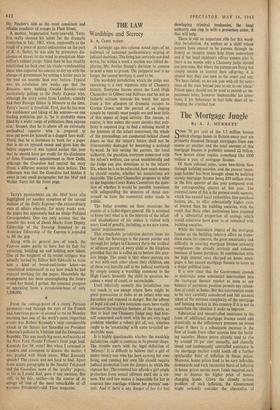THE LAW Wardships and Secrecy
R. A. CLINE writes: A fortnight ago this column noted signs of an outbreak of sustained parliamentary sniping at judicial decisions. The firing has certainly not died down, for within a week a motion was tabled de- ploring Mr. Justice Stamp's decision in camera to send a man to prison. The judgment seat is no longer the sacred territory it used to be.
The wardship jurisdiction which the judge was exercising is a very vigorous relic of Chancery history. Everyone knows about the Lord High Chancellor in Gilbert and Sullivan and his not so fatherly attitude towards his ward, but apart from a few glimpses of dramatic escapes to Gretna Green and the pursuit of an eloping couple by tipstaffs most people see and hear little of this aspect of legal activity. The reason, of course, is that unless the court decides that pub- licity is required (e.g. to find a missing ward) in the interests of the infant concerned, the whole of the proceedings are conducted behind closed doors so that the infant's future shall not be irrecoverably damaged by becoming a national by-word. In this setting the parents, the local authority, the guardian, everyone concerned with the infant's welfare, can speak uninhibitedly and the Judge can give directions as to the infant's life, where he is to be educated, how much money he should receive, whether his associations are desirable. The Lord Chancellor proposes to refer to the Supreme Court Rules Committee the ques- tion of whether it would be possible 'consistent with safeguarding the interests of those con- cerned' to have the committal order made in public.
The Judge assumes on these occasions the mantle of a father-figure-general. He is assumed to know best what is in the interests of the infant and disobedience of his orders is visited with every kind of penalty, including, as we now know, 'secret' imprisonment.
This remarkable jurisdiction derives from the fact that the Sovereign is the parens patriae and through her judges in Chancery she is the residual or ultimate parent of every child in the kingdom provided that she is called on to bestow this mas- sive image. The result is that where parents are at war with each other about their children, one of them can literally call in the judicial matriarch by simply issuing a wardship summons in the High Court. Instantly the child in question be- comes a ward of court, or untouchable.
Until relatively recently this jurisdiction was not much in use except where there might be great possessions at stake or an infant who was parentless and exposed to danger. But the advent of legal aid and a few notorious cases have vastly increased the wardship business of the courts, so that at least one Chancery Judge may find him- self concerned each week with the not very legal problem whether a robust girl of, say, nineteen ought to be 'associating' with some so-called un- desirable man.
It is highly questionable whether the wardship jurisdiction ought to continue in its present shape. The trouble starts with the legal definition of 'infancy.' It is difficult to believe that a girl of under twenty-one who has been earning her own living and running her own life should require judicial protection from the dangers to which life exposes her. The criminal law affords a girl ample protection from sexual offences until she is six- teen. The civil law makes it impossible for her to contract into marriage without her parents' con- sent. And if there is any danger of her (or his) developing criminal tendencies, the local authority can step in with a protection order, if that will help.
There is still an important role for this ward- ship jurisdiction. An orphan or a child whose parents have ceased to be parents through in- tirmity or insanity needs help from somewhere and if the local children's officer cannot give it, there is no reason why a Chancery judge should not intervene. But where the parents are living but simply unable to control their offspring. it is absurd that they can turn to the court and say, 'We have failed; so we ask you with all the sanc- tions of the state behind you to act in our place.' Prison space should not be used to punish an im- portunate lover, however 'undesirable' his inten- tions, if his behaviour in fact falls short of in- fringing the criminal law.


































 Previous page
Previous page